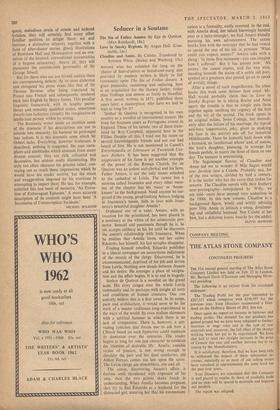Seducer in a Soutane
The Sin of Father Amaro. By Ega de Queiroz. (Max Reinhardt, 18s.) Love in Smoky Regions. By Angus Hall. (Con- stable, 16s.) Claudine and Annie. By Colette. Translated by Antonia White. (Seeker and Warburg, 15s.)
ANYONE who has subsisted for long on the `choice of hors-d'oeuvre or bread-and-marg' diet provided by modern writers is likely to fall ravenously upon The Sin of Father Amaro. A giant plumcake, sustaining and enduring, here is an acquisition for the literary larder, richer than Trollope and almost as fruity as Stendhal. A first novel, written in 1871, published three years later; a masterpiece; why have we had to wait so long for it?
Senhor de Queiroz is recognised in his own country as a novelist of international stature. He lived for fourteen years as Portuguese consul in England. Three of his novels, two of them trans- lated by Roy Campbell, appeared here in the Fifties. Despite all this, I tried out his name on several knowledgeable friends and not one had heard of him. He is not mentioned in Cassell's Encyclopaedia of Literature or Twentieth Cen- tury Authors. It has been suggested that the suppression of his fame is yet another example of the power of the Roman Church, for de Queiroz was an ardent anti-clerical and his hero, Father Amaro, is not the only sinner attached to the cathedral at Leiria. The canon has a mistress called Joanneira and every other mem- ber of the chapter has his `niece' or `house- keeper' in the background. Need anyone be sur- prised if the young, good-looking Amaro, lodging in Joanneira's house, falls in love with Joan- neira's beautiful daughter Amelia?
Orphaned son of a valet, Amaro, with no vocation for the priesthood, has been placed in a seminary at the whim of his aristocratic pro- tector. Sensual and passionate though he is, he yet accepts celibacy as his lot until he discovers the canon's relationship with Joanneira. When he realises that Amelia loves, not her suitor Eduardo, but himself, his last scruples disappear.
Finding himself rebuffed, Eduardo publishes in a liberal newspaper an anonymous indictment of the morals of the clergy Discovered, he is excommunicated, deprived of his job and driven from Leiria. Nothing now stands between Amaro and his desire. He arranges a place of assigna- tion and the affair begins. It is to end in tragedy.
Senhor de Queiroz is a novelist on the grand scale. His story ranges over the whole Leiria community and he portrays with insight all sorts and conditions of human . creatures. One can scarcely believe this is a first novel. In its scope, pace and architecture, it would seem to be the work of a master craftsman long experienced in the ways of the world. Its even realism shimmers with a satirical humour in which there is no lack of compassion. There is, however, a per- vading cynicism that forces one to ask how a aturch based on such hypocrisy could maintain its dominion over the centuries. The reader begins to long for one just character to establish the 'element of desirable life.' Amelia, amiable victim of passion, is not strong enough to shoulder the part and her final comforter, old Abbot Ferrao, comes too late upon the scene. The Leiria clergy are dissemblers, one and all.
The canon, discovering Amaro's affair, is furious until threatened with exposure of his own, then the two priests shake hands in understanding. When Amelia becomes pregnant, they try to find Eduardo as a husband for the distracted girl, assuring her that his excommuni-
cation is a formality, easily reversed. In the end, with Amelia dead, her infant knowingly handed over to a baby-strangler, we find Amaro blandly pursuing his own advancement. The canon mocks him with the reminder that he had vowed to spend the rest of his life in penance. 'What could you expect, master?' Amaro asks with a shrug: 'in those first moments—you can imagine how I suffered! But it has passed now.' All passes.' the canon replies, and the two men, standing beneath the statue of a noble old poet, symbol of a greatness also passed, go on to speak of worldly things.
After a novel of such magnificence, the other books this week seem thinner than usual. Mr. Hall would probably claim that in Love in Smoky Regions he is taking Braine and Amis apart; the trouble is that he simply puts them together again, omitting the cogency of the first and the wit of the second. The book opens in an original milieu, Swiss Cottage, but immedi- ately after the failure of his marriage, the typical anti-hero (opportunist, joky, given to studying his face in the mirror) sets off for industrial Middlecastle. There he instantly beds down with a barmaid, an 'intellectual whore' and, of course, the boss's daughter, planning, in revenge for female perfidy, to marry the three of them on one day. The humour is unremitting.
The Saganesque flavour of Claudine and Annie led me to wonder if Mlle Sagan would ever develop into a Colette. Probably not, for of the two writers, divided by half a century, it is the earlier who has the verve that makes for renown. The Claudine novels with their feathery near-pornography—interpolated by Willy, we are told—must have seemed very audacious in the 1900s. In this new volume, Claudine is a background figure, wisely and wittily advising poor little Annie to jettison a smug, domineer- ing and unfaithful husband. Not Colette at her best, but a delicious bonne bouche for the addict.
OLIVIA MANNING


































 Previous page
Previous page